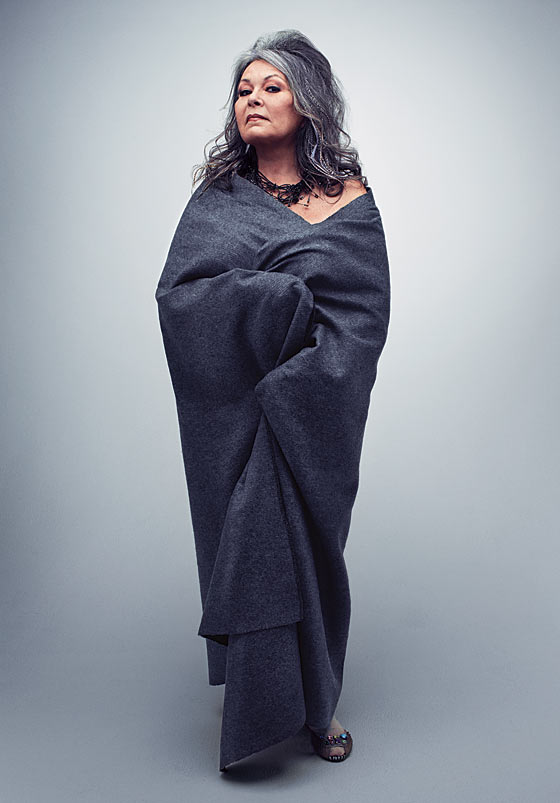And I Should Know
Roseanne Barr was a sitcom star, a creator and a product, the agitator and the abused, a domestic goddess and a feminist pioneer. That was twenty years ago. But as far as she’s concerned, not much has changed.
 |
(Photo: Robert Maxwell. Hair by Campbell McAuley/Solo Artists. Makeup by Shannon Hughey.) |
During the recent and overly publicized breakdown of Charlie Sheen, I was repeatedly contacted by the media and asked to comment, as it was assumed that I know a thing or two about starring on a sitcom, fighting with producers, nasty divorces, public meltdowns, and bombing through a live comedytour. I have, however, never smoked crack or taken too many drugs, unless you count alcohol as a drug (I don’t). But I do know what it’s like to be seized by bipolar thoughts that make one spout wise about Tiger Blood and brag about winning when one is actually losing.
It’s hard to tell whether one is winning or, in fact, losing once one starts to think of oneself as a commodity, or a product, or a character, or a voice for the downtrodden. It’s called losing perspective. Fame’s a bitch. It’s hard to handle and drives you nuts. Yes, it’s true that your sense of entitlement grows exponentially with every perk until it becomes too stupendous a weight to walk around under, but it’s a cutthroat business, show, and without the perks, plain ol’ fame and fortune just ain’t worth the trouble.
“Winning” in Hollywood means not just power, money, and complimentary smoked-salmon pizza, but also that everyone around you fails just as you are peaking. When you become No. 1, you might begin to believe, as Cher once said in an interview, that you are “one of God’s favorite children,” one of the few who made it through the gauntlet and survived. The idea that your ego is not ego at all but submission to the will of the Lord starts to dawn on you as you recognize that only by God’s grace did you make it through the raging attack of idea pirates and woman haters, to ascend to the top of Bigshit Showbiz Mountain.
All of that sounds very much like the diagnosis for bipolar disorder, which more and more stars are claiming to have these days. I have it, as well as several other mental illnesses, but then, I’ve always been a trendsetter, even though I’m seldom credited with those kinds of things. And I was not crazy before I created, wrote, and starred in television’s first feminist and working-class-family sitcom (also its last).
I so admire Dave Chappelle. You did right for yourself by walking away, Dave. I did not have the guts to do it, because I knew I would never get another chance to carry so large a message on behalf of the men and women I grew up with, and that mattered most to me.
After my 1985 appearance on The Tonight Show Starring Johnny Carson, I was wooed by producers in Hollywood, who told me they wanted to turn my act into a sitcom. When Marcy Carsey—who co-owned Carsey-Werner with her production partner, Tom Werner (producers of The Cosby Show)—asked me to sign, I was impressed. I considered The Cosby Show to be some of the greatest and most revolutionary TV ever.
Marcy presented herself as a sister in arms. I was a cutting-edge comic, and she said she got that I wanted to do a realistic show about a strong mother who was not a victim of Patriarchal Consumerist Bullshit—in other words, the persona I had carefully crafted over eight previous years in dive clubs and biker bars: a fierce working-class Domestic Goddess. It was 1987, and it seemed people were primed and ready to watch a sitcom that didn’t have anything like the rosy glow of middle-class confidence and comfort, and didn’t try to fake it. ABC seemed to agree. They picked up Roseanne in 1988.
It didn’t take long for me to get a taste of the staggering sexism and class bigotry that would make the first season of Roseanne god-awful. It was at the premiere party when I learned that my stories and ideas—and the ideas of my sister and my first husband, Bill—had been stolen. The pilot was screened, and I saw the opening credits for the first time, which included this: CREATED BY MATT WILLIAMS. I was devastated and felt so betrayed that I stood up and left the party. Not one person noticed.
I confronted Marcy under the bleachers on the sound stage when we were shooting the next episode. I asked her how I could continue working for a woman who had let a man take credit for my work—who wouldn’t even share credit with me—after talking to me about sisterhood and all that bullshit. She started crying and said, “I guess I’m going to have to tell Brandon [Stoddard, then president of ABC Entertainment] that I can’t deliver this show.” I said, “Cry all you want to, but you figure out a way to put my name on the show I created, or kiss my ass good-bye.”





0 comments:
Post a Comment